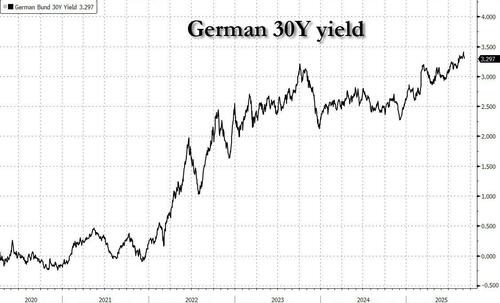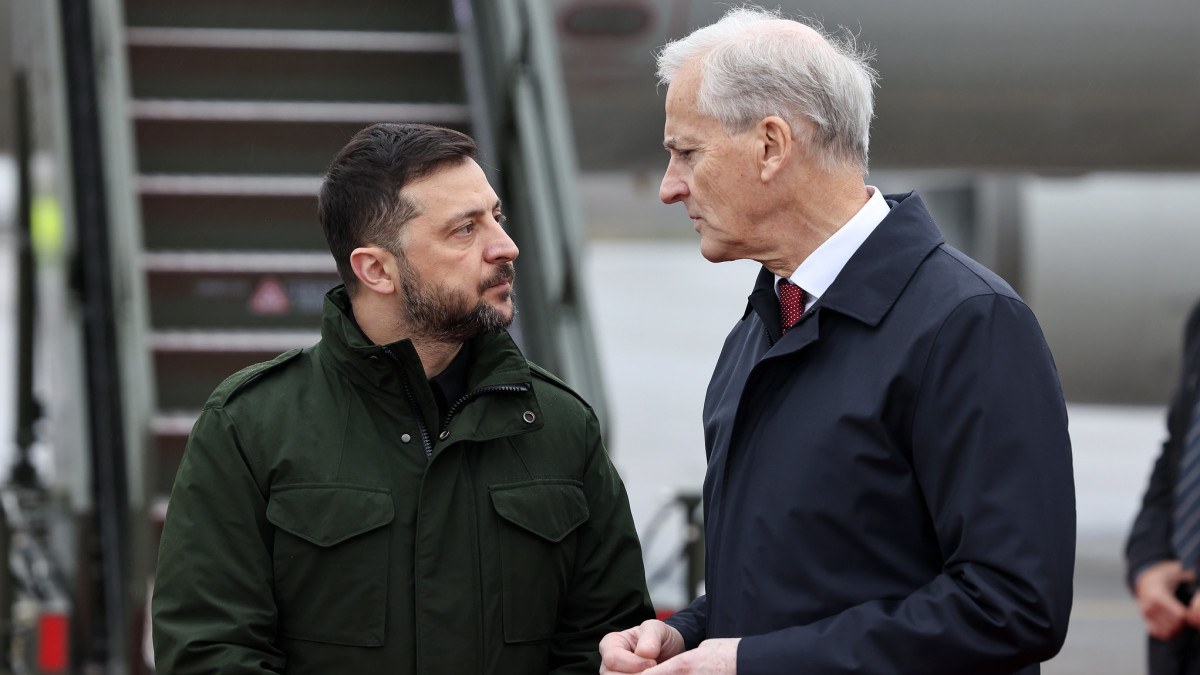
Germany Ignores Bond Market Warnings Amid Fiscal Paralysis
Submitted by Thomas Kolbe
In terms of media strategy, the German government operates on Champions-League level. While the Chancellor emphasizes the pressure for fiscal consolidation in statesmanlike interviews, party representatives simultaneously prepare the public—through coordinated media messaging—for tax increases. Meanwhile, the bond market has already given its verdict: thumbs down.
The Berlin political machine continues in routine mode: budget negotiations consistently end with new borrowing, the Chancellor calls for cuts in the social budget, while left-leaning factions across both parties aim to mobilize taxpayers to fill the yawning gaps in public finances. A hectic debate is underway about the dramatic state of the German economy and the immediate consequences for government coffers. There is no indication that policymakers are bending to reality or abandoning the ideological path that has led to this decline.
Infantile Envy Campaign
This debate is accompanied by an infantile envy campaign orchestrated by the DGB (German Trade Union Confederation), which once again proves itself to be a club of functionaries largely detached from its members. Rather than tackling the structural problems of the economy seriously, the union prefers to light divisive fires.
According to DGB strategists, the wealthy, heirs, and private investors are to blame for Germany’s economic catastrophe. It is a shameful campaign, which—hopefully—will not gain significant traction in the media.
The union confirms the diagnosis that eco-leftist policies and the leadership cadres of business and unions have largely merged into a corporatist unit—held together by the gigantic subsidy machine of the green transformation. The silent cartel is willing to accept the collapse of the German economy, as long as the sweet poison of corruption money—commonly known as subsidies—keeps flowing. As a result, Germany moves forward in a somber mood, socially unsettled, economically paralyzed, and heading toward eco-socialism.
Agenda 2030
The last remnants of bourgeois politics act clumsily, trapped in media routines.
CDU Secretary General Carsten Linnemann now calls for an “Agenda 2030,” apparently aimed at achieving a psychological effect—similar to Gerhard Schröder’s Agenda 2010. In reality, Agenda 2010 was mostly an administrative reform of social welfare: fiscally modest, with savings of at most ten billion euros per year and minimal tax cuts.
Its fame rested not on substance, but on favorable external circumstances: a low-interest cycle, strong global growth, and China’s expansive demand policies made the measures appear far larger than they actually were—a media-exaggerated myth that continues to resonate today.
From the south of the country, calls are growing to reverse destructive regulatory policies in the automotive sector. Bavarian Prime Minister Markus Söder demands the removal of the combustion engine ban and technology-neutral solutions for mobility. At the same time, however, he continues to support one-sided subsidies for e-mobility.
Neither fish nor fowl. He, too, has failed to recognize that the foundations of the German economy are fractured and that piecemeal reforms will no longer suffice. Germany continues to lose capital abroad and refuses to acknowledge the severity of the crisis it has itself triggered—through erratic energy policy, dogged support for the proxy war in Ukraine, and a grotesque open-border policy.
Heating Law as Blueprint
At least policymakers are beginning to realize that the economic disaster will soon manifest in sharply declining tax revenues. Now would be the time to unleash the economy and enable new growth. Yet no one dares challenge the green agenda. This is particularly evident in the Building Energy Act (GEG).
It will burden citizens with more than nine billion euros annually, even though households and businesses have already reached their limit. Rather than making rational corrections, policymakers insist on ideological mandates.
Emission targets remain unchanged; only timelines, financing, and alternative heating options—such as pellet stoves—are under discussion. Thus, the law remains a central pillar of the green agenda, fully absorbed by the party cartel.
Prisoners of the Cult
Berlin already knows this agenda has failed. Yet, from a media-psychological perspective, it has so thoroughly infected the parties that their representatives are unable to correct this dramatic mismanagement. Citizens now pay the price for political vanity and infantile ideology. Climate propaganda and Russia-phobia are used to align them with an economic artifice—whether it is the green subsidy economy or the new war economy—keeping it artificially alive.
When distilled, the German debate over state debt, regulation, climate policy, and the endless saga of defending democracy against supposedly imperial, invasion-ready Russia paints a clear picture: politicians have entrenched themselves in morally elevated narratives. With emphasis, plenty of historical bending, and reality denial, they persist undeterred.
Even the increasingly fragile situation in Ukraine hardly affects their decisions. There is no real Russian diplomacy; instead, the expensive war economy is pushed forward with full force—all to maintain the illusion of a functioning, morally superior state and to keep the credit mechanism alive.
Bond Markets Unimpressed
The German self-reflection meets deaf ears in the bond markets. Pressure is growing everywhere on over-indebted states. Interest rates are rising, and with them, fiscal leeway is shrinking. Germany’s debt mountain of 2.5 trillion euros currently costs the Treasury—i.e., taxpayers—around 34 billion euros per year in interest.
If interest rates continue to rise at a similar pace as in recent years, rough calculations suggest that about 13 percent of debt must be refinanced annually, adding roughly seven billion euros in interest costs each year.
Every one-percentage-point increase in interest rates triggers interest expenses of 27 billion euros under current debt levels. The situation is therefore more than merely dramatic. Neighboring France faces a week of truth, with a confidence vote in parliament. Prime Minister François Bayrou’s government is attempting budget cuts of 44 billion euros, which is already considered doomed given political divisions in parliament. The country braces for general strikes and political chaos.
Klingbeil Holds Course
In Germany, Finance Minister Lars Klingbeil continues on his course. Next year, he plans additional government spending of four percent, expanding the federal budget from 502 billion euros to over 520 billion euros. His calculations rely on overly optimistic assumptions. The ongoing economic depression will severely strain social funds and force the federal government into further borrowing and supplementary social payments.
Anyone who thought the economic crash would pressure policymakers to end their crash course with reality is sorely mistaken. Stubborn, ideologically radicalized, and detached from reality, the Merz-Klingbeil duo continues Brussels’ disaster agenda unabated. Debt and senseless government spending are intended to trigger a turnaround. Market-oriented reforms are nowhere in sight, as these would imply a loss of power and the political willingness to focus on core state responsibilities.
If economic decline materializes in the coming months through rising refinancing costs and widening deficits, it will be fascinating to see who the first strike-breakers in the political apparatus will be—who abandons the sinking ship or demolishes the firewall, forcing the collapse of the party cartel.
We must not underestimate the power of the bond market: no central bank in the world can permanently control the yield structure of over-indebted states if the market has already given its thumbs down.

* * *
About the author: Thomas Kolbe, born in 1978 in Neuss/ Germany, is a graduate economist. For over 25 years, he has worked as a journalist and media producer for clients from various industries and business associations. As a publicist, he focuses on economic processes and observes geopolitical events from the perspective of the capital markets. His publications follow a philosophy that focuses on the individual and their right to self-determination.
Tyler Durden
Mon, 09/08/2025 – 06:30













